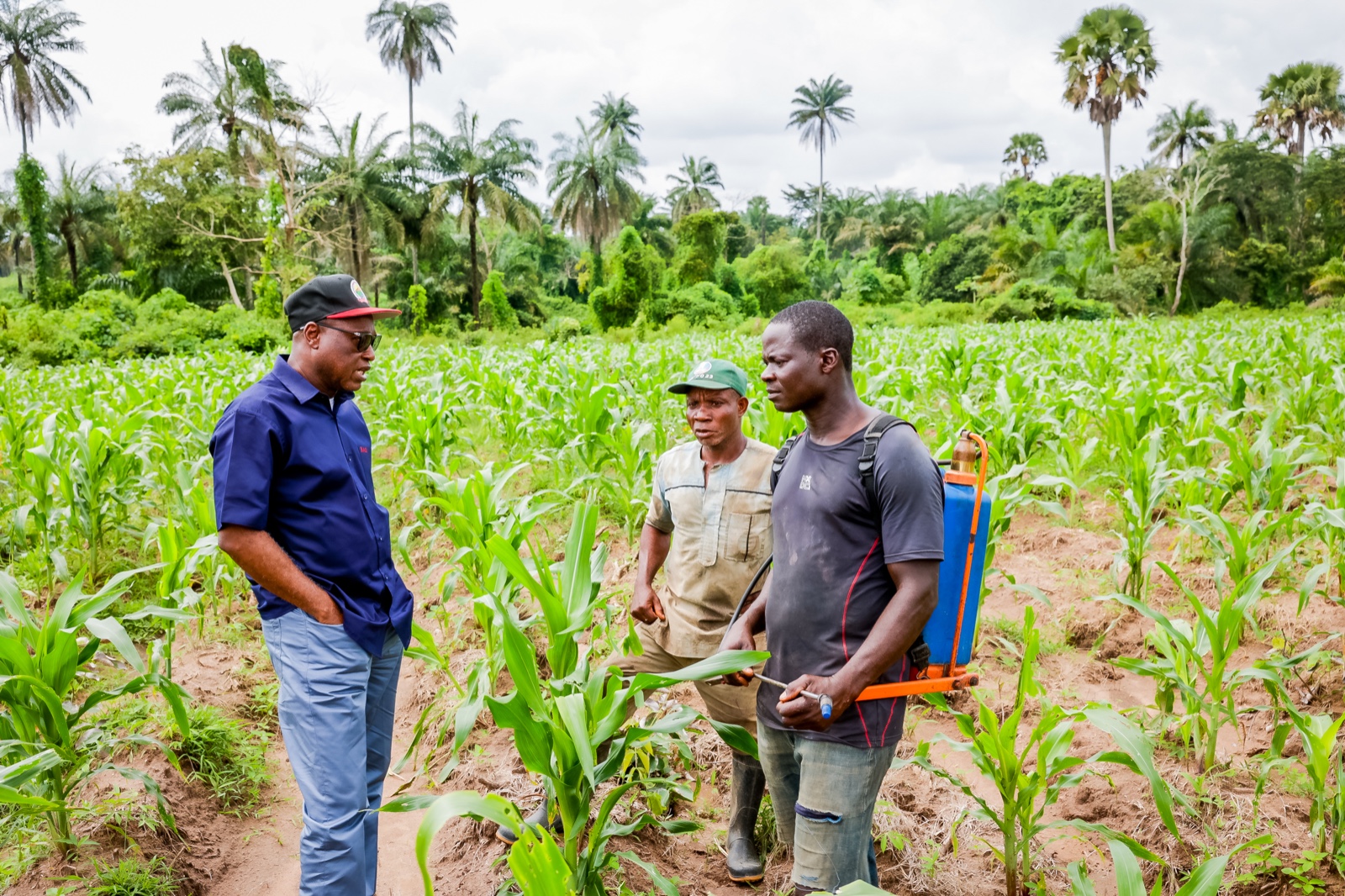Gov. Biodun Oyebanji: Cultivating Ekiti’s Future through an Agricultural Revolution
On a day when most Nigerians were commemorating the nation’s Independence with parades, speeches, and celebrations, His Excellency, Governor Biodun Oyebanji of Ekiti State (affectionately known as BAO), chose a different path—one rooted in the fertile soils of his state. As others waved flags, BAO was leading his team through muddy tracks, visiting farms, and ensuring the implementation of his visionary agricultural policies. It was an unorthodox way to celebrate Nigeria’s 64th Independence anniversary, but it was a powerful statement of where Ekiti State is headed under his leadership.
BAO’s recent tour of Ekiti’s agricultural clusters has captivated many, not just for the symbolism of a governor getting his hands dirty but for what it signifies: a long-term commitment to transforming the state’s economy through agriculture. For several days, Governor Oyebanji has been visiting farm settlements across the state, observing firsthand the progress of his administration’s agricultural policies. This isn’t just about agriculture—it’s about Ekiti’s future, and it is a future deeply intertwined with a shared prosperity agenda designed to elevate the state’s fortunes.
At the heart of BAO’s efforts is an inclusive 30-year Agricultural Plan that aims to transform Ekiti’s farming sector by 2050. This long-term vision is designed not merely for the next election cycle but for the next generation. Governor Oyebanji has made it clear that this blueprint is about building a sustainable economy, creating jobs, and ensuring food security for the people of Ekiti State.
Over the Independence Day weekend, Governor Oyebanji and his team visited various farming clusters across the state. On Saturday, they toured Okeako (with its 4 clusters), Iyemero (another 4 clusters), and Gede (7 clusters). On Independence Day itself, the Governor led visits to Ikere (4 clusters), Emure/Eporo (5 clusters), Aramoko (4 clusters), and Ado (2 clusters). Each location is unique, with different crops cultivated and different farming techniques employed.
In Emure, vast fields of maize and cassava dominate the landscape, providing both sustenance and employment for the local population. The Ikere cluster is dedicated to yam and melon farming, while Aramoko has become a hub for horticultural farming, with fruits and vegetables taking center stage.
But this was no ordinary tour. When the Governor arrived in Aramoko, torrential rains had turned the roads to mud, causing vehicles to get stuck. Security personnel advised the Governor to turn back, but BAO, ever the determined leader, refused. “If the farmers endure this every day, I should too,” he reportedly said, hopping on a motorcycle and navigating the treacherous path for 35 minutes until he reached the farmstead. The farmers were overjoyed to see their Governor, mud-streaked and smiling, standing with them in solidarity. It was a powerful moment—a leader showing that he is not above the people but with them, in their struggles and in their triumphs.
Governor Oyebanji’s agricultural plan isn’t just about boosting crop production; it’s about creating opportunities, especially for the youth. Under his leadership, Ekiti’s agricultural sector is being transformed into a viable and attractive career path for young people. As part of this transformation, more farm roads are being constructed, with bridges to improve access to remote farmlands. Dormitories are being built to provide comfortable accommodation for the youth working on these farms. Security measures are being strengthened to ensure the safety of farmworkers, and vehicles and motorcycles will be provided to ease transportation challenges.
This is the kind of comprehensive agricultural development that will not only feed Ekiti State but will also create jobs, stimulate local economies, and foster a sense of pride among the people. For too long, farming has been seen as an arduous and unprofitable endeavor, but under BAO’s leadership, it is becoming a central pillar of Ekiti’s economic future.
While Governor Oyebanji’s focus on agriculture has captured the attention of many, it is only one part of a broader strategy to develop Ekiti State. Since taking office, BAO has worked tirelessly to improve infrastructure, healthcare, and education. Roads are being constructed and rehabilitated, not just to connect cities but to link rural communities and farms to urban centers. Healthcare services are being improved, with investments in hospitals and rural health programs to ensure that no community is left behind. Education is receiving attention too, with vocational training programs designed to equip young people with the skills they need to thrive in a modern economy.
BAO’s approach is holistic, addressing not just the immediate needs of the state but laying the foundation for a prosperous and self-sufficient future. His policies are designed to empower communities, create sustainable economic growth, and ensure that every Ekiti citizen has access to the opportunities they deserve.
Governor Biodun Oyebanji’s leadership represents a rare opportunity for Ekiti State. His vision for agricultural transformation and economic growth is clear, and the results are beginning to show. However, no leader can succeed alone. It is up to the people of Ekiti State to rally behind this vision and support the government’s efforts.
This is not just about politics—it’s about the future of Ekiti State. The decisions we make today will determine the state’s trajectory for generations to come. With BAO at the helm, we are on the right path, but it requires the collective effort of all Ekiti people to ensure that this progress continues.
Even those who may not agree with every decision of the government must acknowledge the importance of the work being done. The agricultural revolution underway in Ekiti is real, and it has the potential to change the lives of thousands of families. It is creating jobs, improving infrastructure, and making Ekiti a leader in food production. This is a future worth fighting for, and it requires the support of every citizen.
Governor Biodun Oyebanji is not just a politician—he is a statesman, a leader with a clear vision for the future of Ekiti State. His dedication to agriculture, his willingness to get his hands dirty, and his unwavering commitment to improving the lives of the people are all testaments to his transformative leadership.
Ekiti State is blessed to have such a leader at this critical time in its history. BAO’s agricultural policies are laying the foundation for a prosperous future, one where Ekiti is self-sufficient, economically vibrant, and a model for other states to follow. But this vision cannot be realized without the collective support of the people.
Now is the time for all Ekiti citizens to come together and support this progressive government. Whether you are a farmer, a student, a business owner, or a civil servant, you have a role to play in building the Ekiti of tomorrow. Let us unite behind Governor Oyebanji’s vision and work together to ensure that Ekiti’s future is one of prosperity, progress, and shared success.
The journey may be long, but with BAO at the helm, there is no doubt that Ekiti State is on the right path. Let us walk this path together, for the sake of our children, our state, and our future.
Folorunso S. Aluko, a Psephologist and Development Expert writes from Oye-Ekiti, Nigeria.
